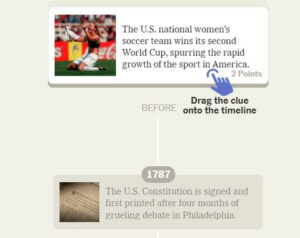Climate change may be the existential crisis of our times, but many young people leave secondary school still lacking basic knowledge of what that means.
That’s why News Decoder is partnering with the Climate Academy on a two-year plan, funded by Erasmus+, to mobilize high school students that combines storytelling and climate Education.
Leading the EYES project – Empowering Youth through Environmental Storytelling – for News Decoder is Amina McCauley, who grew up on the side of a mountain in the Tasmanian ranges of Australia known for the looming Pelion West or Cradle peaks.
“I think that students these days learn of climate change passively, through social media, through other people,” McCauley said. “But perhaps they don’t get given the tools of activation, which could be, for example, communication, journalism and the understanding of media, how to be critical of sources.”
In the project, News Decoder and its partners, the Climate Academy at the European school of Brussels II and Superfluous, a youth empowerment organization from the Netherlands, will train students to generate multimedia content about climate change through articles, podcasting and video.
Making climate change science accessible
To address the need for young people to learn about the planet, the consortium will create accessible learning tools for teachers and encourage cross-border collaborations with schools in Europe and Africa.
“I believe that the purpose is to give young people the knowledge and the tools to be able to help make the changes that are so important,” McCauley said.
The project comes out of a previous Erasmus-funded series of projects that News Decoder did with the Climate Academy called The Writing’s on the Wall, or WoW.
As part of the WoW project, Climate Academy head Matthew Pye spurred high school students in schools around the world to create murals that depict how climate change affects them. For its part, News Decoder published a series of articles that “decoded” the effects of climate change around the work, held an international storytelling contest for young people and produced a series of Ecologues, or live webinars with the American Library of Paris, focused on climate change. All the articles and webinars produced from the project are available on the News Decoder site.
News Decoder Educational News Director Marcy Burstiner said the WoW project got young people involved in climate change action in all kinds of different ways.
“In the storytelling contest, students found local people to profile who were doing things like creating slow fashion companies and creating national parks and establishing tree planting programs,” Burstiner said. “In designing and painting the murals, they were thinking about the ways climate change affected them and the communities they lived in.”
Empowering young people to take action
EYES picks up where WoW left off, hoping to expand more creative outlets of journalism, while also focusing on the importance of working more directly with teachers and students in secondary schools. Through December 2025, WoW will be head first in schools in Belgium, France and the Netherlands. That will expand to workshops in eight schools in other countries, four of which will be in Africa. These workshops will focus on using multimedia journalism skills to tell stories based on foundational climate change science.
These workshops are expected to produce student-generated videos, podcasts and articles. News Decoder and its partners will also create educational resources for teachers and hold in-person teacher training workshops as well.
“I really hope that the materials reach a wide audience –– meaning, a global audience –– of schools all around the world, because it will be accessible,” McCauley said. “And so far, I feel as if with the consortium and expertise that the Climate Academy has, and the tools and expertise that News Decoder has, I really believe that this gives young people the best starting point in how to communicate the issues of climate change.”
McCauley moves into the EYES project even as she has been teaching about the environment and communications the University of Tasmania, where she studied journalism. McCauley stressed the pertinence of any climate change topics being present in the classroom.
“I genuinely believe it is an important part of school curricula today,” she said.
#EYES #telling #stories #climate #change




More Stories
Six in Ten Black Single Mothers Will Vote For Candidates Who Support School Choice – NJ Education Report
Abraham Lincoln: Fun Facts, Biography, and More
FAFSA delays are leaving students in limbo. California campuses don’t expect help